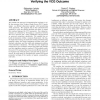Free Online Productivity Tools
i2Speak
i2Symbol
i2OCR
iTex2Img
iWeb2Print
iWeb2Shot
i2Type
iPdf2Split
iPdf2Merge
i2Bopomofo
i2Arabic
i2Style
i2Image
i2PDF
iLatex2Rtf
Sci2ools
95
Voted
SIGECOM
2008
ACM
2008
ACM
On the communication requirements of verifying the VCG outcome
We consider the amount of communication required to verify the outcome of the Vickrey-Clarke-Groves (VCG) mechanism: an efficient allocation together with incentivizing VCG payments. We compare this to the communication required to verify the efficient decision rule alone, to assess the overhead imposed by VCG payments. Our characterizations are obtained by leveraging a connection between the VCG outcome and a price equilibrium concept known as universal competitive equilibrium. We consider four related environments within a common framework: the classic single-item setting, the multi-unit setting with decreasing marginal values, the classic assignment problem with unitdemand valuations, and the multi-unit assignment problem with substitutes valuations. We find that the single-unit settings have zero overhead, whereas the multi-unit settings can have significant positive overhead. With multiple units, the na
Related Content
| Added | 15 Dec 2010 |
| Updated | 15 Dec 2010 |
| Type | Journal |
| Year | 2008 |
| Where | SIGECOM |
| Authors | Sébastien Lahaie, David C. Parkes |
Comments (0)

